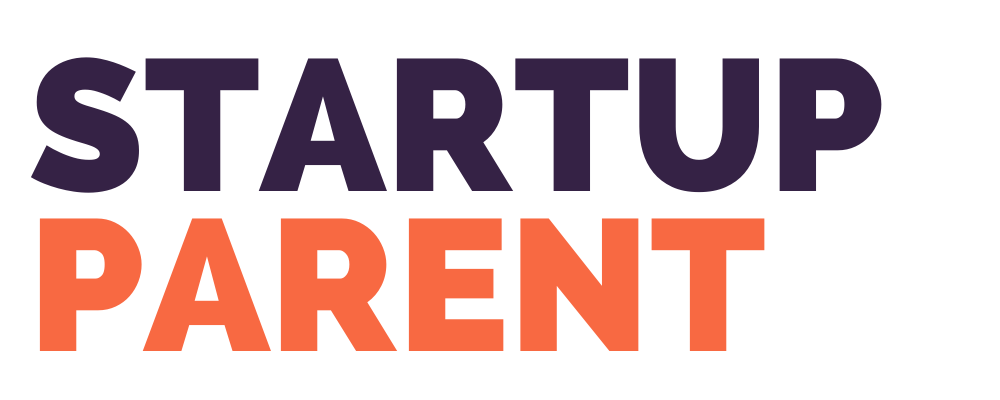When Will I Get My Body Back? Motherhood As Awakening — Episode #221 with Amanda Montei
Stop. Touching. Me.
What exactly are you allowed to say as a mother if you’re feeling overwhelmed, over-touched, without a moment to yourself, at the beck and call of other people, and completely inundated with demands? You’re not allowed to say that it’s brutal—you asked for this when you signed up to be a mom, right?
“Touched out” is a term that has gained popularity in the last decade.
It describes the feeling you get when you’ve reached your limit of physical contact and being needed; when your skin is crawling and your body is screaming to have some independence and agency again.
For many moms, being touched out is a common struggle. According to Amanda Montei, mothers get pushed to that breaking point because the way we view women’s bodies culturally has structured how we parent.
How do misogyny and motherhood intersect with consent and control?
Amanda Montei is an author, lecturer at California State University, East Bay, and has been teaching at the college level for over a decade. She joined Sarah on the Startup Parent podcast to talk about her latest book, Touched Out: Motherhood, Misogyny, Consent, and Control.
If you’ve ever wondered why it’s hard to slow down, feel pleasure, or enjoy sex, this book connects the dots.
It is obvious when reading Touched Out that Amanda has a depth of knowledge about feminism and culture. She writes extensively about the body, and what it means to be a woman and a mother socialized in this world.
Women have complicated relationships with their bodies, especially in terms of the contradictory rules we are expected to follow and the way we show up in service for others. Over time, we can start to wonder if our body is even ours.
Where do we end and where do others begin?
So much of modern parenting culture tells us that we should give ourselves over completely to our kids: to be there at night to soothe them at all times, to allow them to crawl and climb and pull. It reinforces the decades-long conversation that your body really isn’t your own, and it isn’t for you.
Overriding the needs of your body and your own self in service of others is so second-nature to many women that it’s hard to see it at first. Amanda draws a connection between the way that girls and women are socialized to always put others first, to be quiet and demure, to be domestic goddesses, to be beautiful—to the completely overwhelming and dehumanizing landscape of motherhood and parenthood today.
The common through-line between a culture that blames women for being assaulted and a culture that breaks mothers down emotionally and physically is a culture that wants to control women’s bodies.
When girls and women are socialized to be quiet and demure, to be of service, and to put others first, they are sold a message that their bodies are for other people. If we don’t deconstruct these deeply ingrained beliefs and ideologies, we risk perpetuating harmful norms and inadvertently indoctrinating the next generation into a culture of power imbalances and violation.
Amanda’s goal is to challenge societal norms and open a dialogue about our bodies and their purpose. This is an essential conversation for anyone who has been gendered as a woman, and is navigating the seas of motherhood, body autonomy, and societal expectations.
Join us in this thought-provoking and low-key infuriating conversation with Amanda Montei as we unpack the complexities of motherhood, body autonomy, consent, and control—and explore the transformative potential of redefining these societal narratives.
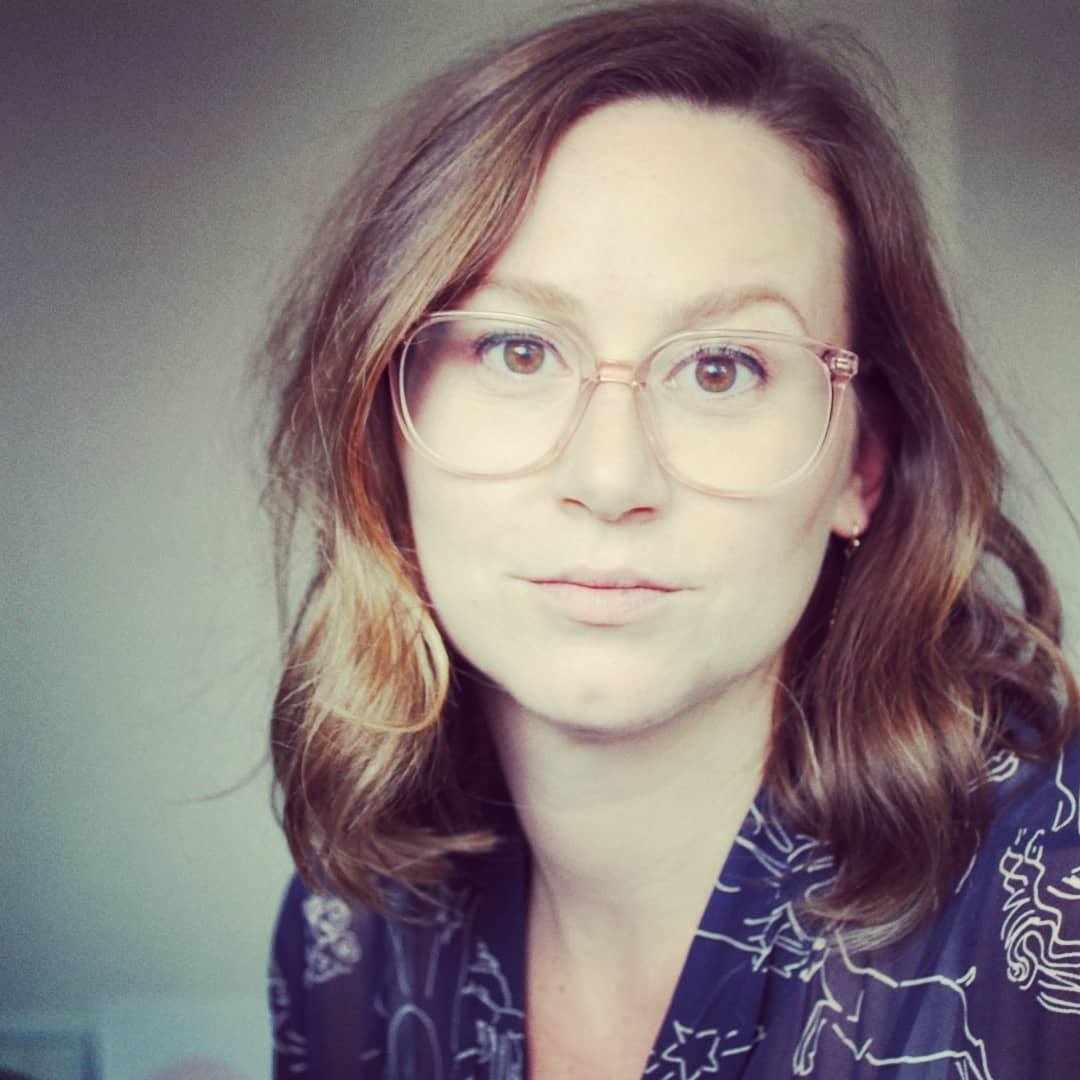
FEATURED GUEST
Amanda Montei, Author and Educator
EPISODE SUMMARY
In this episode, Sarah and Sara discuss:
- The rules and expectations imposed on women’s bodies: Amanda reveals the multitude of contradictory demands we face, from being a sexual being while limiting our own pleasure to the endless standards of beauty we’re expected to meet.
- Society expects women to know exactly what they want: Women also bear the responsibility of saying no. But, as Amanda explores, it’s not always that simple. The fear of retribution and violence often makes saying no a daunting task.
- The Unspoken Rule about sexuality: Society dictates that women’s sexual pleasure should always serve men and reproduction, often leaving little room for their own satisfaction. This pervasive mindset erases the possibility of “I don’t know” or “I’ve changed my mind,” stripping women of their agency.
- Amanda’s Personal Journey: Growing up, Amanda didn’t have a clear understanding that her body belonged to her, because she was heavily influenced by societal pressures that catered to the male gaze. As sex positivity entered the conversation, she grappled with the tension between liberation and acquiescence to misogyny.
- Parenting in the #MeToo Era: Amanda reflects on how #MeToo has transformed the parenting landscape, emphasizing the importance of cultivating a language to discuss issues like consent, pleasure, and autonomy.
- Unveiling Misogyny: Amanda uncovers how early experiences shape women’s understanding of their bodies and intimacy. Often, women are taught that their pleasure is inconsequential, existing solely for male enjoyment.
- Reclaiming Sexual Identity: Breaking free from societal constraints requires awakening to previously unnoticed patterns and beliefs. Amanda doesn’t profess to have all the answers but encourages curiosity as a crucial step in this journey.
- Open Your Eyes: Unlearning misogyny is a gradual process. It begins by recognizing and acknowledging the systemic issues that shape our perceptions of women’s bodies and experiences.
- Motherhood’s Impact: Motherhood can unlock trauma held within our bodies, as Amanda poignantly explores. The relationship with one’s body and motherhood often centers on control, a dynamic that changes dramatically once the experience is lived.
- Connecting the Dots: Amanda highlights the profound links between motherhood, misogyny, consent, and control. These themes all involve the manipulation and governance of women’s bodies and experiences.
Links and resources mentioned:
- Touched Out: Motherhood, Misogyny, Consent, and Control by Amanda Montei
- Amanda’s Substack: Mad Woman
“Central to rape culture is this idea that women’s suffering is inevitable. Women’s violation and pain is normal and natural. But when we look at the institution of motherhood, we also see a very similar logic operating there; this idea that losing one’s bodily autonomy is part of parenthood.
The suffering of motherhood, or pregnancy and childbirth, is used to excuse other ways in which violation happens, but also, vice versa.”
— Amanda Montei
CONVERSATION HIGHLIGHTS
Key ideas & supporting quotes from the conversation
Women are faced with layers of contradictory rules and expectations from society.
“There’s so many contradictory roles and expectations. Right? So I thank you for sharing your own connection to your body because I think that so many people who grow up as girls and women struggle with these questions. I mean, you should be a sexual object, but you shouldn’t be too sexy, and you shouldn’t have or enjoy too much pleasure, especially if it’s with yourself or with other women or with children—or anyone other than a white cis-man. You should be a doting mother, but you shouldn’t be too much of a doting mother because then it’s pathological and you’re gonna mess up your children in a weird, creepy way that’s in all of the murder mysteries, right? You should be thin, of course, but also not too thin. And you shouldn’t be like too worried about your appearance.” (Amanda Montei)
“What’s so fascinating about this, and even as I struggled to, like articulate the question is, is that I guess, I suppose I’m like searching for like a clear map, like, here’s the 10 bullet points framework of how you’re gendered as a woman, and these are the 10 beliefs, and here’s how you overcome them. Right? Like, I’m looking for simplicity. And yet, the problem is that, like, it’s confusing, and I am still confused, and I’m still unsure, and I’m still uncertain.” (Sarah K. Peck)
“[There’s] a really important sort of contradictory expectation or rule, right, that comes up when we talk about consent, which is that women are supposed to sort of unfailingly know what they want, say no at the right time. But the reality is that like many women find themselves and girls find themselves like sort of playing out these social scripts.” (Amanda Montei)
“The suppression of voice—not just the suppression of desire, but a voice and identity—we see this so much in motherhood culture… Becoming a mother, it felt like there was all these voices that I was supposed to be speaking, and none of them were my own. I had to like, contort my body a certain way, and like, I had to smile, you know, and even knowing about all these issues, it was just this very intense cultural pressure to shape myself and sound a certain way.” (Amanda Montei)
The burden is placed on girls and women to stop or prevent sexual violence by always knowing what they want.
“There’s a fear of, well, if I say no, there could be more violence or retribution, right. So that’s really complicated, but then just the, you know, on a basic human level, even if we weren’t taught from a very young age, to not trust our own voices, and if we were not taught to shape our desire and our bodies and our sense of pleasure around men and the male gaze, it’s just confusing sometimes to know what we want, right? And so that’s not allowed. And that places this really undue burden on girls and women to sort of stop or prevent sexual violence by just unfailingly always knowing what they want.” (Amanda Montei)
“The moment that, you know, let’s say you’re getting intimate with somebody for the first time. And you’re in that navigating that space of trying to figure out like, where are we going, and what are we doing? And consent, which is a new phenomenon, this idea of permission, consent, and you’re like, oh, I should say, Yes, I should want this. This is what I’ve been cultured to want. There isn’t really a space for For people to say, Oh, I don’t know, or I changed my mind, or I changed my mind.” (Sarah K. Peck)
We need the language to talk about things like consent, pleasure, desire, and being in our bodies.
“Part of the learning that we do around bodies just kind of comes from finding a language to talk about these things to talk about consent, pleasure, desire, the fact that we even have a body.” (Amanda Montei)
“There was this acquiescence to a sort of undercurrent of misogyny, which was that men took advantage of women… Some of these conversations with my mom, when I was young, learning about women in my family, who, for generations, you know, had private secret abortions or gave themselves abortions at home. So this was all very matter of fact; that this was just kind of the way that the world was. And, you know, I say all this much like fault, my, my mom, which we love to do, right, blame everything on parents. But she didn’t have the language to teach me about like autonomy, consent. I mean, I think post Me Too, like, we’re just finding that. And this book is so much about parenting after Me Too, and starting to find that language, while being a new parent, and just sort of like realizing all this stuff. And then how can I bring this into parenting?” (Amanda Montei)
“Once a woman has expressed some form of desire, she’s removed herself from protection for whatever happens later.
Maybe you do want to flirt with somebody at the bar, but that doesn’t mean that you want them to violate you.”
— Amanda Montei
Central to rape culture is this idea that women’s suffering, violation, and pain is inevitable—conditioning that continues into motherhood.
“This comes back to some of the things that we were discussing earlier; this idea that, well, you didn’t know what you want, you didn’t know what you wanted so therefore, that’s [getting raped] on you, right? Or you made this choice to go to this place, or to know this person, and therefore, it’s your fault. So there’s so many ways in which rape culture is reinforced culturally and politically. But when we look at the institution of motherhood, we also see a very similar logic operating there. So this idea that losing one’s bodily autonomy is sort of part of parenthood, there’s this degree of acceptance around the ways that mothers will suffer, these really extreme ways. And again, this is the central thesis of rape culture.” (Amanda Montei)
“What you’re doing in this book is drawing the line between or the ways or whatever the connection matrix between living in a world of rape culture into parenthood and being like, we’re actually parenting in the age of rape culture, which means the way we’re taught to parent, the way we’re taught to mother, the expectations we have about our bodies in motherhood, the expectations we have about what our children have access to, the fact that they we’re supposed to just completely give ourselves over to our children, to our husbands if we’re in heteronormative relationships, the fact that we’re supposed to kind of disappear, wither away and not have pleasure, like, that also was rape culture. We’re parenting in the age of rape culture. It’s shocking to read about, it’s really upsetting and frustrating. It’s also eye-opening and enlightening.” (SKP)
Mothers are systemically disempowered and dismissed, but still expected to take care of everything and everyone.
“[There’s] this really high burden that’s placed on women’s speech and actions to prevent their own assault. And I think that it’s important to think of this in the context of motherhood because we so often see, not only this idea that like mothers need to solve the problem of parenthood in America all by themselves, you know, as individuals. But also, that we need to teach our children the language of consent, and autonomy. And I’m all for that 100%—but that too places is really heavy burden on mothers, right? Like Jacqueline Rose, she writes about, like, the mother is like the scapegoat. But look, also, she’s expected to solve everything, you know?” (Amanda Montei)
“Most women, most people who are not white cis-male folks, you know, they understand that there are these forces that play throughout their lives, and that there’s a continuity there. And we can say, it’s because we live in a culture of misogyny, it’s the patriarchy. Like, yes, true, but also, I wanted to give that granular, real personal, fleshy detail to what that looks like and what that feels like, and give us some more language that we can use to talk about how these institutions are connected, how girlhood grooms us for motherhood. Like, someone gave me a doll when I was a baby, right? My mom, like she also seemed like disempowered, so I thought that’s how it was gonna be. But there’s much more there. There’s much more that happens as a result of these systems of power.” (Amanda Montei)
“The mother blame thing, part of this comes back to our obsession with attachment, parenting and attachment culture, which comes from shaky science around attachment, which essentially says that it is the mother, usually the assumed primary caregiver, who in the first couple years of life, basically decides the fate of their child. And there’s been all this weird, conservative rhetoric around it lately, around the first four years of life like core memories, but also like peak experience, you know? And if you go back to work, or do anything else other than create peak experience core memories for your kids, they’re going to be ruined. Right? And but this is just rhetoric, right? This is all just rhetoric in service of keeping women in the home. But attachment theory forgets that there’s an entire society, right? It forgets that. Hopefully, we are living outside of just the home with the mom for not just the first four years of life, but for all of our lives.” (Amanda Montei)
Being touched out doesn’t make you a bad mother. Moms have needs too, and shouldn’t be punished for meeting them.
“The idea that, sometimes it’s really frickin annoying for a tiny baby to have unfettered access to your body. And, you’re just like, ‘Get off of me. I don’t want to be touched, I don’t want…’ Like, that’s your body saying, ‘I’m done here. I need some personal space.’ And you connect that back to rape culture, because the idea for a woman to say ‘no’ and to say, ‘I don’t want to,’ ‘I don’t like that,’ ‘no’ as a complete sentence, ‘I need a break,’ is unfortunately counterculture. And so often it’s seen as being an affront to somebody else, or as a cause of somebody else’s pain. It’s like, ‘Hey, I don’t want to hold the baby right now.’ And it’s like, ‘Oh, my God, you’re responsible for destroying this baby’s psychological health because you wouldn’t give unlimited access.’ It’s like, no, I put the baby down. The baby’s crying. The baby’s communicating. I need a break. Baby’s gonna be fine.” (Sarah K. Peck)
“It goes so far down into the cascade of like, you have to wear your child at all times, and you have to respond to them at all times, and you should never sleep, and you should report yourself, and everything should change. And like, you should just basically be miserable and disintegrate as a human being in order for your child to be securely attached—and that’s gonna be good for your kid, right? And actually, like, having a stable mother might be good for your kid too, you know?” (Sarah K. Peck)
“Every way that we try to understand parenting is always so child-centered. And this too, just comes back to that idea—that’s because we don’t really care about or value women’s bodies. Underlying there is this idea that this is what women’s bodies are for, right? Is that moment, that erasure that comes with parenthood, this is what it’s all been leading up to. This is your self-actualization… disappearance. Why are you so unhappy? You chose this, right? You asked for it.” (Amanda Montei)
“The go-to example [of rape culture] is the dismissal of rape as a joke.
If you look at the way that we culturally represent motherhood, the suffering mom is a joke.
The mother is the scapegoat, but also, she’s expected to solve everything.”
— Amanda Montei
QUOTES FROM THE EPISODE
Excerpts from the transcript of the conversation
Sarah K. Peck: “There’s also just a big void. There’s a big gaping void of things that we’re not told or taught or encouraged to explore. And that is things like, what do you want? What does feel good to you? What do you want to do? What do I feel? And all of those questions get shoved so far away because they’re never even brought up.”
Amanda Montei: “That’s the best that we can ask for, is not to not to be in pain, right? Or like, feeling like you’re gonna throw up.”
Amanda Montei: “I start by thinking about childbirth and my own attempt to control it or understand it, which was also an effort to control or understand my body, but the narrative of motherhood and make it something different than what I knew, culturally, the institution is. I mean, I’m trained in feminist theory. So, in narrative, I understood all these things, but walking through it is totally different than understanding it intellectually.”
Amanda Montei: “Who or what is being served by keeping these separate? Why does it feel so dangerous to talk about sexuality and motherhood, when we know that the very concept of motherhood is inextricable from the way that we think about sexuality and relationships, and family? These things are all connected.”
Sarah K. Peck: “It’s so loud in the fact that everything is placed at the foot of a woman.”
Amanda Montei: “Girlhood grooms us for motherhood.”
Sarah K. Peck: “Talking over a woman and telling a woman that what they think or feel is not actually what they think or feel, or that it’s unacceptable to say no, is, to me, the epitome of rape culture.”
Sarah K. Peck: “If you have hundreds of thousands of voices in your head that are other people’s voices, it’s the societal voices. It’s the thousands of conflicting messages on Instagram. It’s the confusion about what role you’re supposed to play. Is it any wonder you can’t find your own voice?”
“Much of modern psychology, some men wrote some ideas mid century. We’re still trying to make them work.”
— Amanda Montei
GRAPHICS
If it resonates, share this episode and feel free to share these graphics.
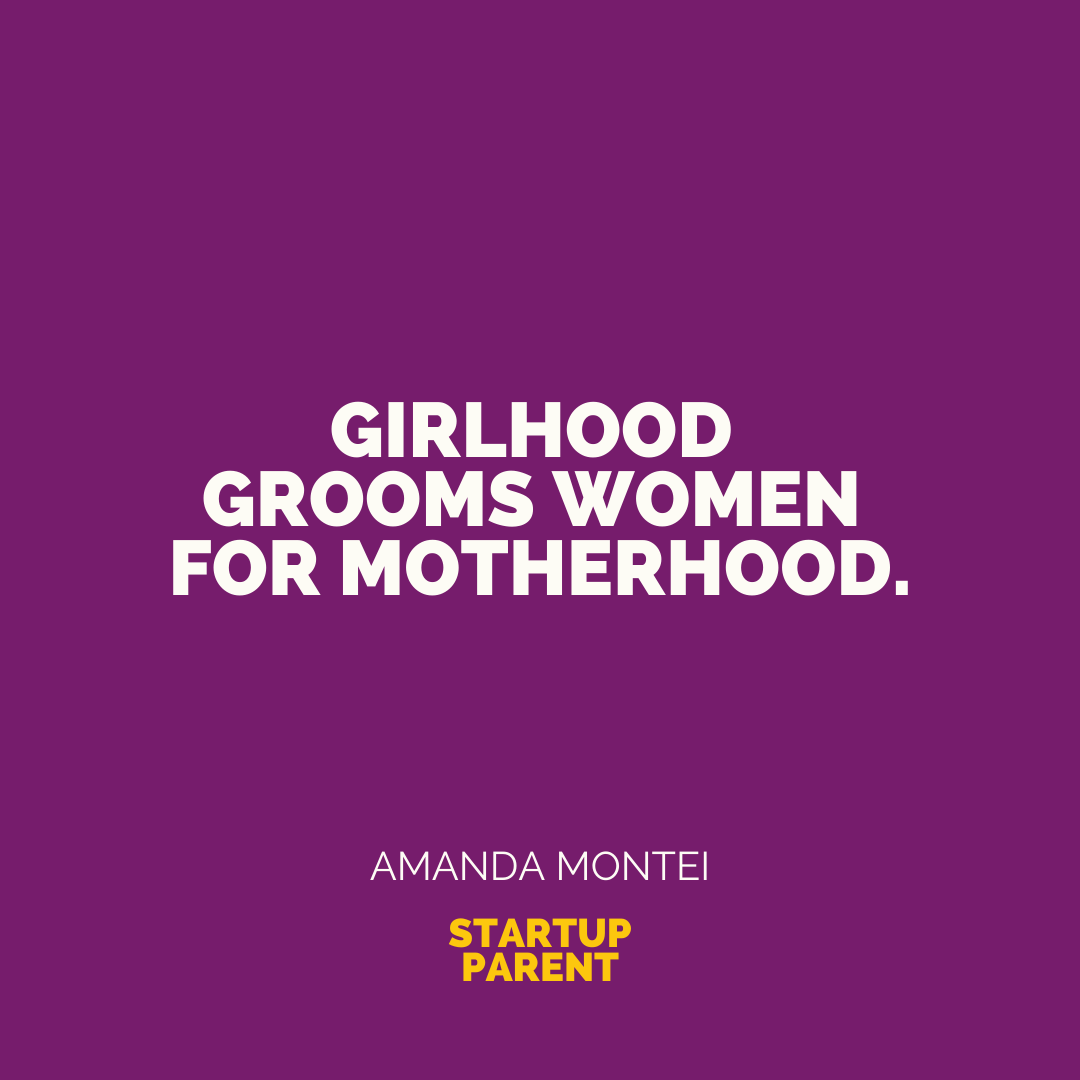
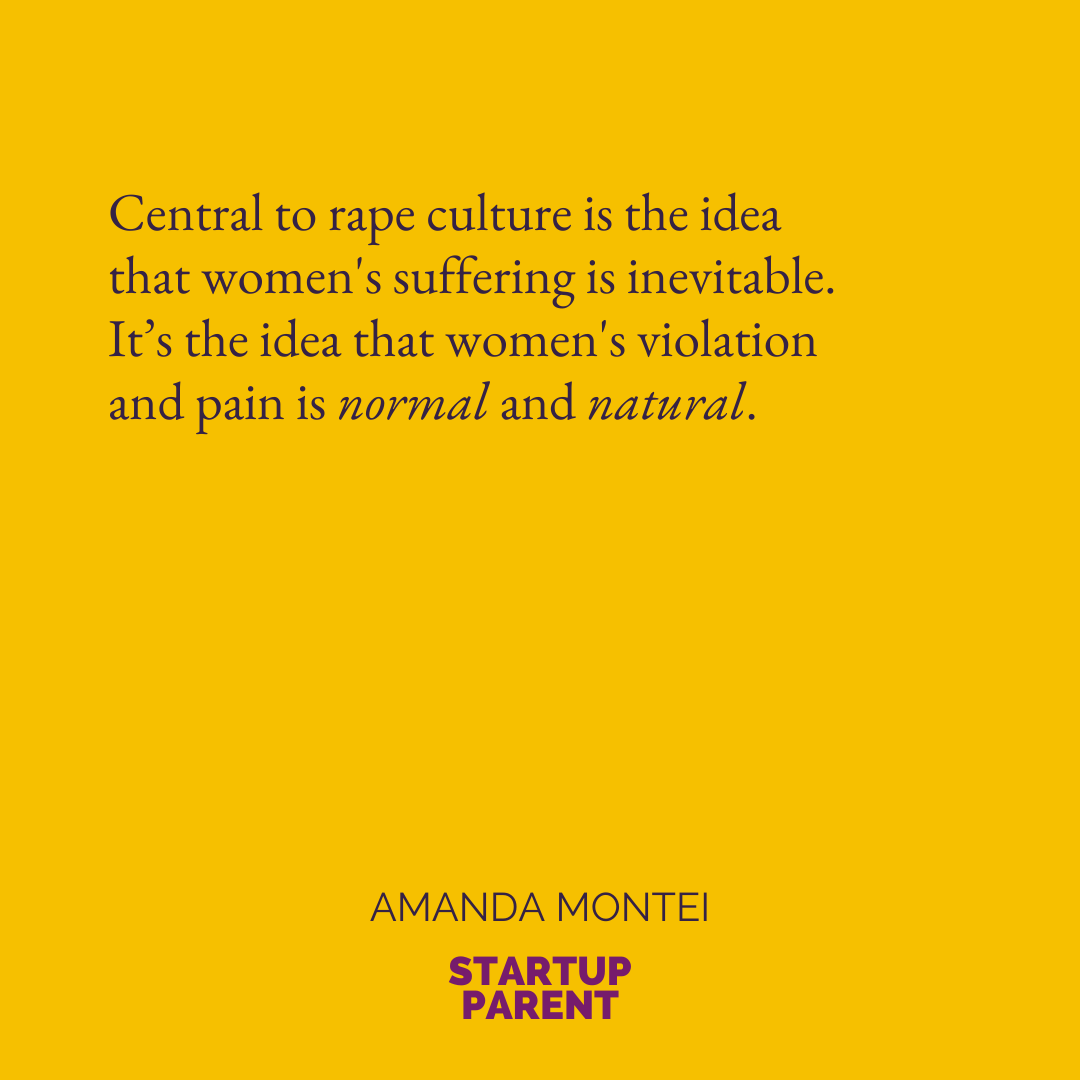
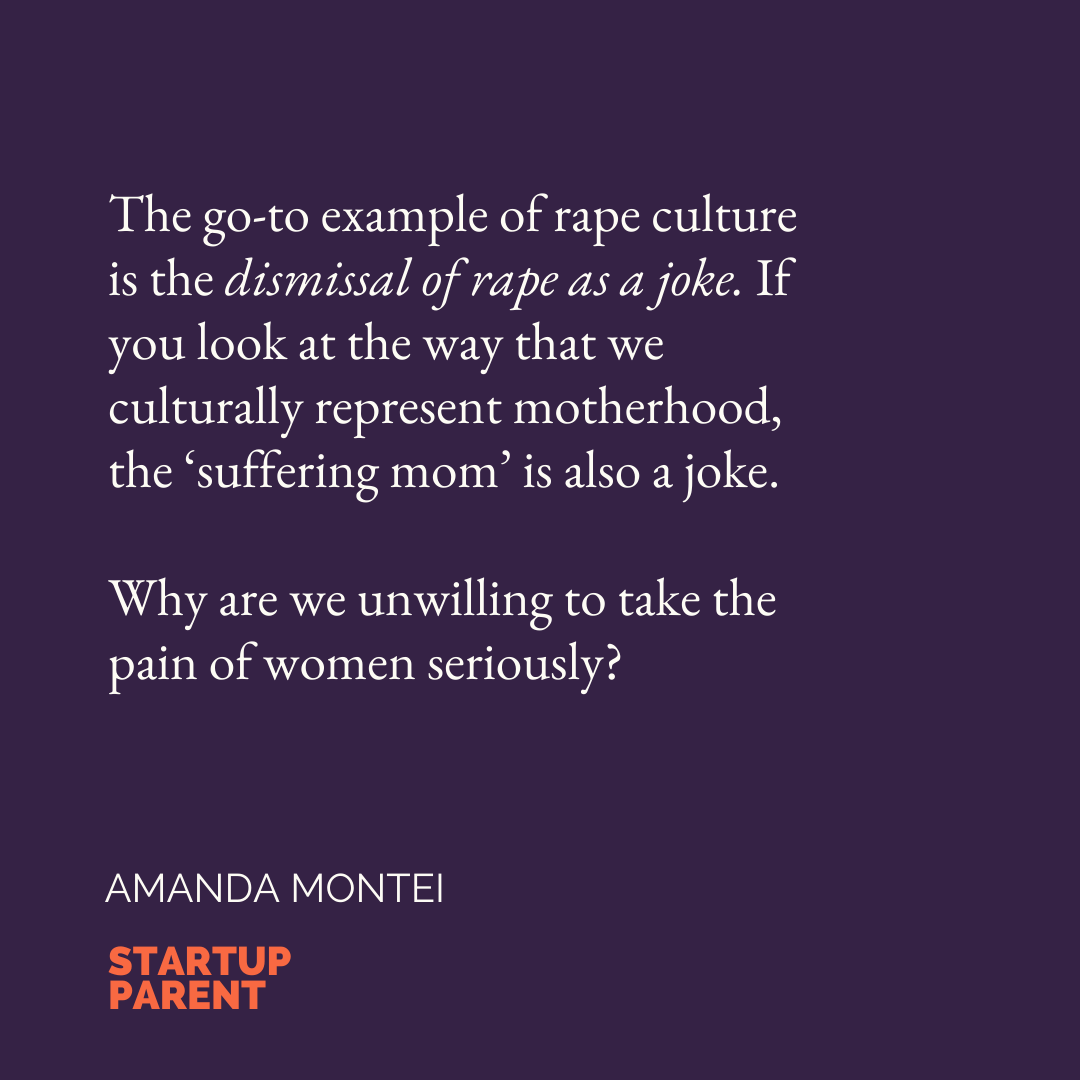
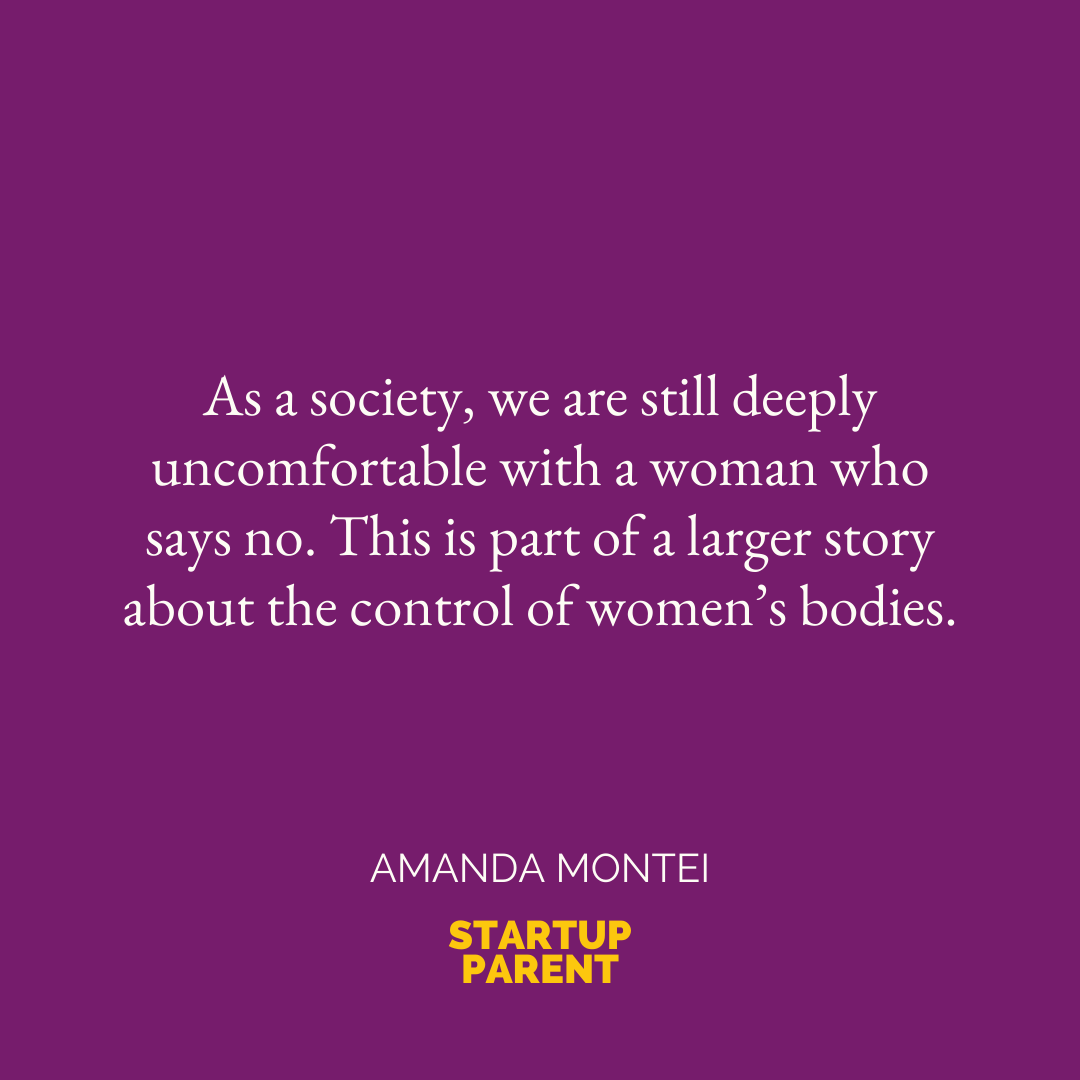
ABOUT THE STARTUP PARENT PODCAST
If you're growing a business, leading a team, or figuring out entrepreneurship and you have kids, this podcast is for you. We go in-depth with founders and entrepreneurial parents about what it really takes to have babies, grow businesses, and get a little bit of sleep. Sign up for the newsletter to get new episodes in your inbox. And leave us a review on iTunes.
Listen to The Startup Parent Podcast on Apple ★ Spotify ★ Google ★ Overcast ★ Stitcher ★ Castbox or wherever you listen to podcasts. Find another podcast player or the RSS feed here.
